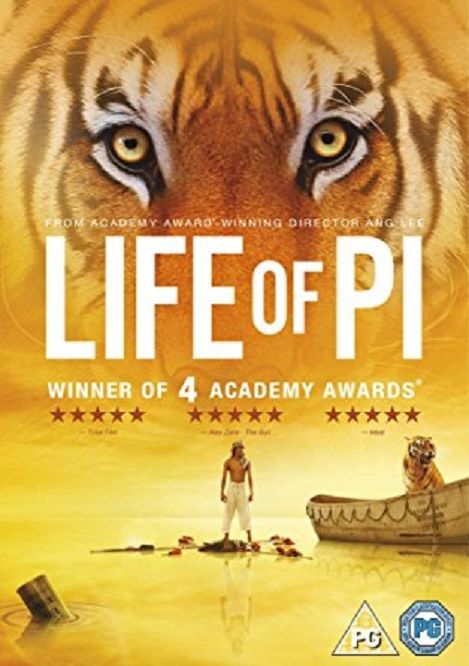"Life of Pi" by Ang Lee - movie review
Jan Martel's bestseller "Life of Pi" - telling about the fantastic journey of the young Pissin (Pi) who, after a shipwreck for 227 days, wanders among the waters of the Pacific on a small lifeboat in the company of a graceful but bloodthirsty tiger named Richard Parker - is one of those "books" considered by most people to be unfamiliar. And in truth, there was a moment in which it seemed that, unlike another time, it really is (you know, most of these books are still filming, and it's successful) because over the years, not one or two directors - among the their names like M. Knight Shamalan, Alfonso Couaron and Jean Pierre-Jönne - failed in their attempts to bring the novel to the big screen. Despite the difficulties, however, as well as his main character, the screenplay was struggling for survival and finally "revived" under the direction of Ang Lee, in a truly magnificent way, though not without deficiencies.

From the audio-visual presentation "Life of Pi" is a real miracle / feast proving that in the hands of an excellent master, such as Ang Lee, computer effects and 3D presentation can be a tool with great narrative, emotional and aesthetic power, if they are a function of the narrative and its purposes. Because whatever the scope and technical perfection of the vision (of course there are defects, but in the context of the particular scenes and the film as a whole, I personally would call them insignificant), it always follows the logic of history and characters, and Lee nor does it for a moment shift its focus from them, even when it seems to have fallen more towards the direction of "beauty." Not everything in the movie is "pink". The narrative structure (the frame of the narrative) is extremely cliché, cumbersome and dull. The whole film is presented as a retrospective. Elder Pix tells his incredible story of a young writer (of course, with creative problems) who seeks to rediscover himself and his place in the world - he has heard from Pi's "Uncle" that his story will make him "believe in God ". Even if we accept the argument that we need the story element, it does not include the character of the writer who does not contribute absolutely to the whole story. Another bad moment is when we understand that the story of Pi could have a different shape. I can swallow ... call it a "rational" story, nothing that changes the meaning of the movie that I have unreservedly believed so far. In itself, it is extremely interesting, although it has been put forward just literally in seconds to illustrate how poorly ill are the poor, impotent capitalists (atheists) who are incapable of seeing the "beauty" in the Faith, and the more I think about it, the more I am horrified by the blackness of human nature, and at the same time I am impressed with what we are capable of in order to survive and stay with all of us.

What I can not accept is the answer given by Pi to the final question which of the two stories is the real one? The answer, which is in "Prometheus" ("This is what I choose to believe"), is inexpensive and elementary - "And which of the two stories do you prefer to be true?". In short, what does it matter if it is true, the important thing is to feel good - faith makes the world a much nicer place. For me, this is the most bothersome and initially erroneous argument for the benefit of anything. And, in the end, how hiding the cruel reality from itself and the world is tied to God? In fact, we all know how. Hundred times would be better if the "rational" story was spent a little longer, and finally we were not starved with elementalism, but we were left to take our own conclusions and believe what we want. Or, it would just have ended when Piper favored Richard Parker, and he did not even turn around. The whole motif with the impossibility of getting your last goodbye was wonderful and definitely works great. I can not help but say a few words about the actors, especially about the stranger Sharjah Sharma whom Lee chooses for the role of Pi, and who is a really great hit and brings the entire film to his shoulders. The boy makes an incredible role, which I suppose was associated with extreme psychological and physical tensions. The only moment in which an actor breaks out is when he tells the "rational" story, although this can be seen as a directorial decision - a kind of commentary on some of the topics mentioned above. Everyone else is either mediocre or just OK. An exception is made only by the tiger Richard Parker, who is a true piece of art. It is not a coincidence that I put it among the actors because its screen presence is exceptional and in no way succumbs to Sharma, although it is by no means anthropomorphized or decorated. For a moment I did not doubt that I saw a real wild animal.
For the final, I want to say that, despite its few flaws, "Life of Pi" is a really great film that will hit you with its impressive visual presentation, make it more emotional than you to put on another tear, and gave you a lot of food for thought. This is definitely one good movie to watch.